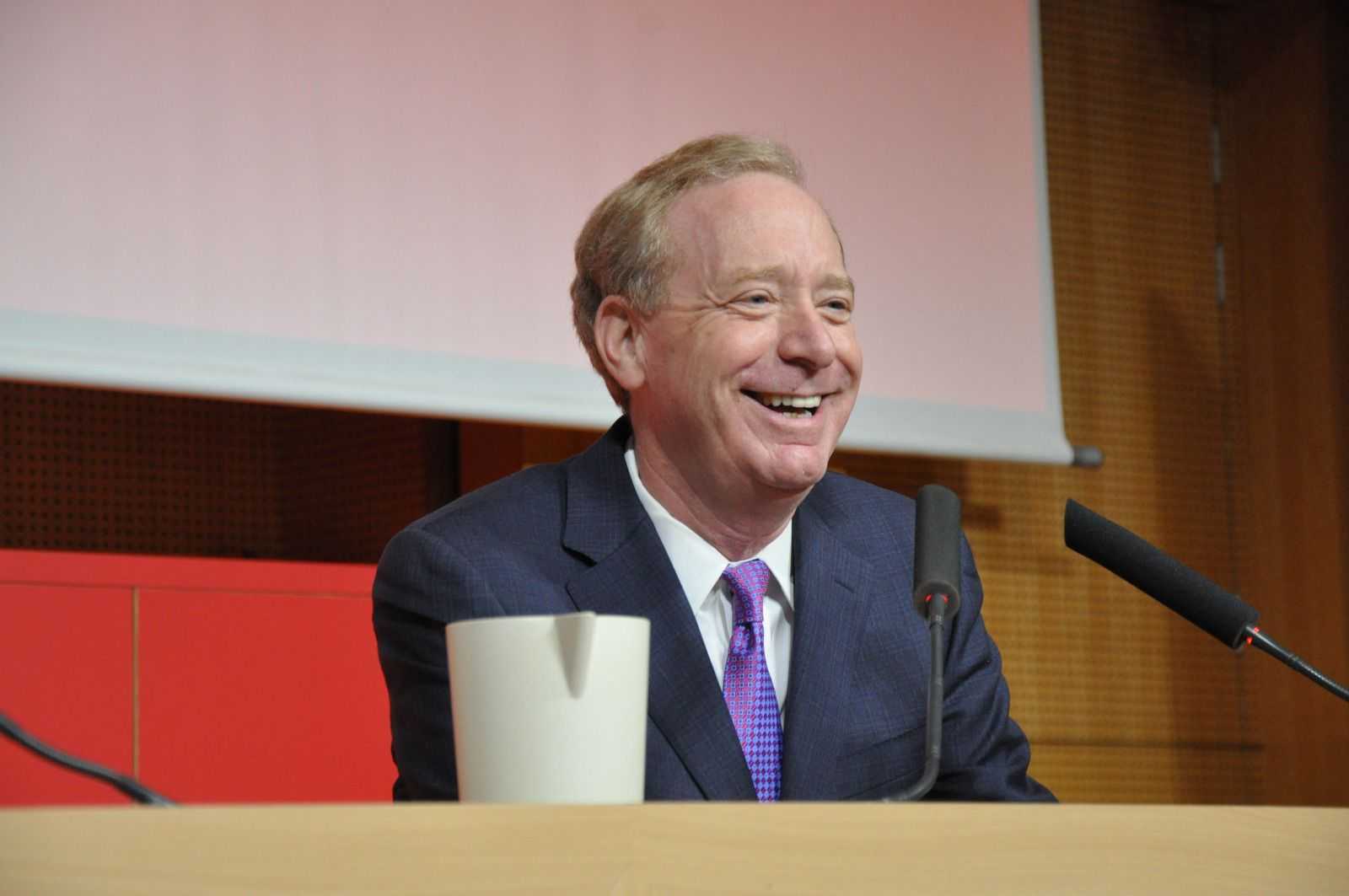Home>Cyber Diplomacy with Brad Smith: On Technological Sovereignty in a Globalised World

17.11.2021
Cyber Diplomacy with Brad Smith: On Technological Sovereignty in a Globalised World
“I feel like it was only yesterday that I was sitting in your seat thinking about what I would do with the rest of my life,” were the words with which Brad Smith, Microsoft’s vice-chair and President, began his talk "Cyber Diplomacy: Critical Challenges in Cybersecurity and Digital Sovereignty" last Wednesday, November 10th. Looking out over the audience full of students interested in the questions he would go on to raise throughout the course of this event, Brad Smith focused his discussion on three key subjects: digital sovereignty and where it is going, cybersecurity, and cyber diplomacy.
Technology’s Influence on Modern-Day Sovereignty
Brad Smith began his discussion of digital sovereignty by situating the conversation in the context of nationality on an individual level. He asked the audience, “When people ask you ‘Where are you from?’, probably the first thing you say is the name of the country that you’ve come from.” Indeed, looking out into the room, Brad took a moment to marvel at the “one hundred and ten countries represented at Sciences Po”, before underlining the ways in which these one hundred and ten countries are fundamentally linked to sovereignty. “The world that comes together here is divided into territories, each territory is a country, each country is led by a government, and the government exercises sovereignty over that territory.”
Having established the individual’s relationship with their country and thus with that country’s government, Brad Smith went on to explain, “[Sovereignty] means that within each territory, the government has the power to decide who will be taxed and how much, what the law will be and how people will need to obey it, how it will be adjudicated in the courts, how the foreign affairs of that country are managed. That’s sovereignty as it has existed for 400 years.” Indeed, according to Brad Smith, there have only been two industries throughout the course of these 400 years that have threatened this concept of sovereignty: in the United States, the railroads in the 1880s and the banks in the 1900s. In these instances, Brad noted, the government was forced to reassert its sovereignty over companies by introducing new controls.
According to Brad Smith, the newest incarnation of this phenomenon in which privatized powers threaten government sovereignty comes in the form of tech. In his words, “No one should be above the law. No person, no company, no technology, no industry... The essence of sovereignty is to reassert the power of the law.” His approach is thus to advocate for new government controls over the tech industry. To him, these new controls should also include a renewal of governments’ commitments to combating cybercrime through cybersecurity, as well as a new approach to cyber diplomacy that takes the current role of private companies in international diplomacy into account.
The Role of Tech Companies in International Cybersecurity
In the second part of his talk, Brad Smith went on to advocate for an international approach to cybersecurity, arguing that as technology has become ubiquitous worldwide, it is no longer tied to national borders and concerns but rather affects all countries regardless of national affiliation. From land to sea to air, according to Brad Smith, human conflict has reached a new dimension: cyberspace.
Yet this new dimension is one whose protection comes not only from governments, but from tech companies themselves. As he noted in his talk, “We used to look to governments alone to protect our national borders… Today a lot of the defences on which governments rely are built by companies.” Indeed, to protect against ransomware, nation-state attacks, disinformation campaigns, and disruptions of the software supply chain, Brad Smith emphasised the fact that companies such as Microsoft have an important role to play in informing consumers so that action can be taken.
Cyber Diplomacy on a Global Scale
Due to the fact that technology does not remain within national borders and therefore is not subject to the same government controls as companies, Brad Smith advocated for what he calls a “digital Geneva Convention”, in which “governments around the world would have a moral and legal obligation to protect civilians in times of war” and “on the internet in times of peace”. According to him, international cooperation from both governments and companies will be essential moving forward in order to combat cybercrime and ensure digital sovereignty.
As Brad Smith came to the conclusion of his talk, he mentioned the Paris Peace Forum and his hopes for the 21st century moving forward. “What will the future bring?” he asked. “Do you know who will decide?” Looking out over the crowd of Sciences Po students from near and far, he affirmed, “You will decide. It is the people of your generation… who will decide where we take this.”
Indeed, to envision a world in which digital sovereignty and cyber diplomacy are able to carry out the task of protecting citizens on a global scale, Smith emphasised the importance of constructing a path forward and finding new ways of adapting to a technologised world, telling students: “We need you to build on what some of us have started and find new paths forward, to innovate in new ways, and to do it with the spirit you experience here everyday.”
The Sciences Po Editorial Team
Find out more
- About the event's organiser: The Paris School of International Affairs
